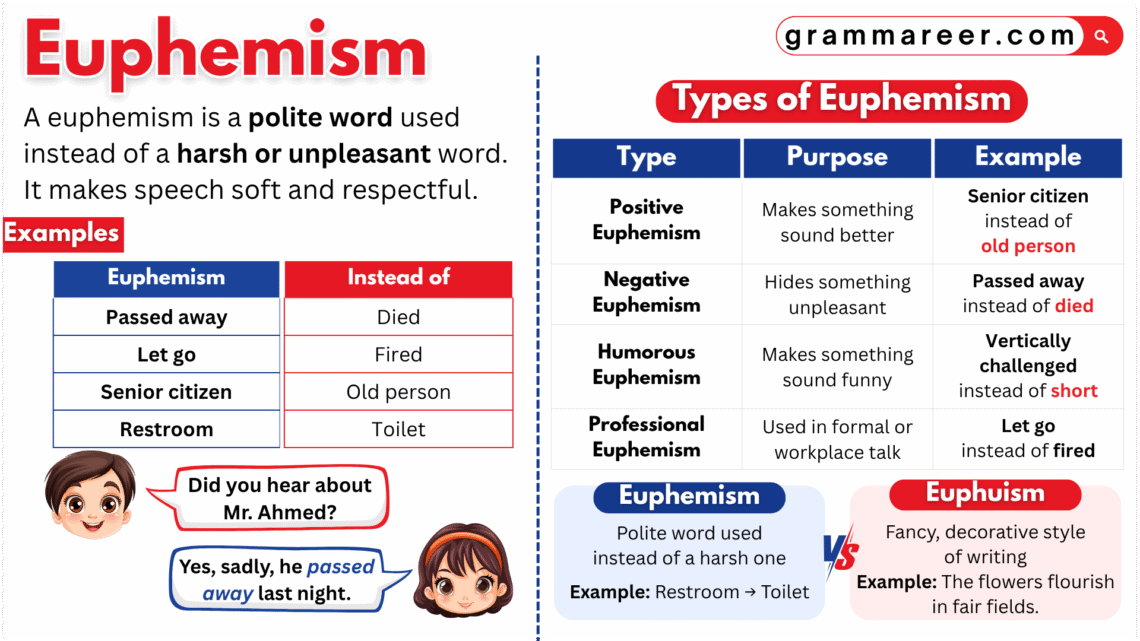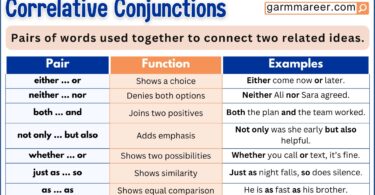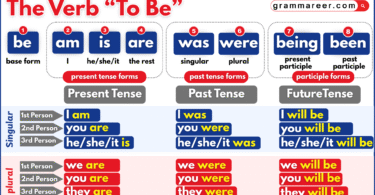Words matter—not just what we say, but how we say it. Sometimes, we need to talk about sensitive topics like death, illness, or job loss without sounding harsh. That’s where euphemisms help.
A euphemism is a polite way to express something unpleasant or uncomfortable. For example, instead of “He died,” we might say “He passed away.” It softens the message and sounds more thoughtful. We use euphemisms every day—in conversations, workplaces, and even the media—to stay respectful, avoid awkwardness, and make serious topics easier to discuss.
In this article, you’ll learn what euphemisms are, why they’re used, and how to use them naturally in daily life.
Table of Contents
What Is a Euphemism? – Meaning and Definition
A euphemism is a polite or indirect way of saying something that might sound harsh, unpleasant, or uncomfortable. It helps us talk about sensitive topics — like death, aging, or losing a job — without hurting someone’s feelings or sounding rude.
For example, instead of saying “She was fired,” we say “She was let go.” These expressions soften the impact and sound more thoughtful.
The word euphemism comes from the Greek word euphēmizein, meaning “to speak with good words.” So, whenever you use a euphemism, you’re basically choosing kind and careful language to make your message sound more pleasant.
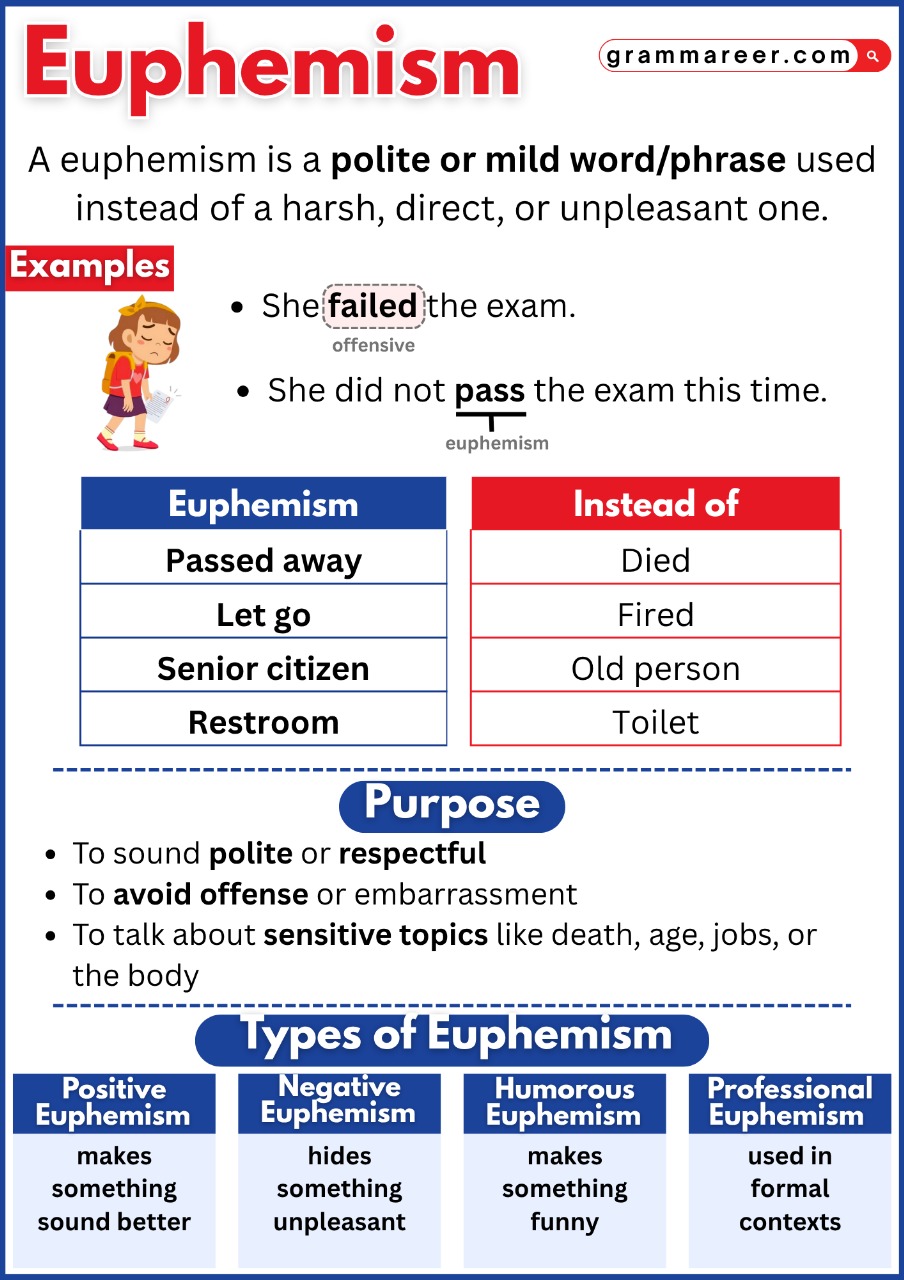
Using Euphemisms in Everyday Life
We all face moments when we need to say something unpleasant like bad news, criticism, or serious updates but there we want to keep things polite. That’s where euphemisms help. They let us express difficult ideas in a softer and more thoughtful way.
When using euphemisms, it’s important to understand what they really mean and use them sincerely — not sarcastically. Euphemisms are meant to show care and respect, not to hide the truth completely. The goal is to sound kind, not confusing.
Examples of euphemism in a sentence:
- Instead of saying “He died last year,” you can say “He passed away last year.”
- Rather than “She’s old,” you might say “She’s a senior citizen.”
- When someone lost their job, you could say “He was laid off” instead of “He was fired.”
See how these little changes make a big difference? Euphemisms help you sound kind, respectful, and thoughtful in your speech.
Types of Euphemisms
Euphemisms come in different forms, and each one helps us express tricky ideas in a gentler way. Whether you’re writing, speaking, or just chatting with friends, they let you say something serious without sounding too harsh or rude. Let’s take a quick look at some common types of euphemisms and how we use them in everyday life:
| Type of Euphemism | Definition | Example |
| Abstraction | Creates a new way of talking about a situation | Referring to prison as “going away for a while” |
| Indirection | Makes the speaker seem less directly involved | Saying someone had “a little work done” instead of cosmetic surgery |
| Litotes | Softens the topic by understating it | Saying someone is “not exactly poor” instead of “filthy rich” |
| Mispronunciation | Alters a harsh word’s pronunciation to soften it | Using “frigging” instead of a stronger word |
| Personification | Assigns human-like names to uncomfortable subjects | Referring to menstruation as “a visit from Aunt Flo” |
| Slang | Informal or coded words used within a group | Saying someone is “in hot water” instead of “in trouble” |
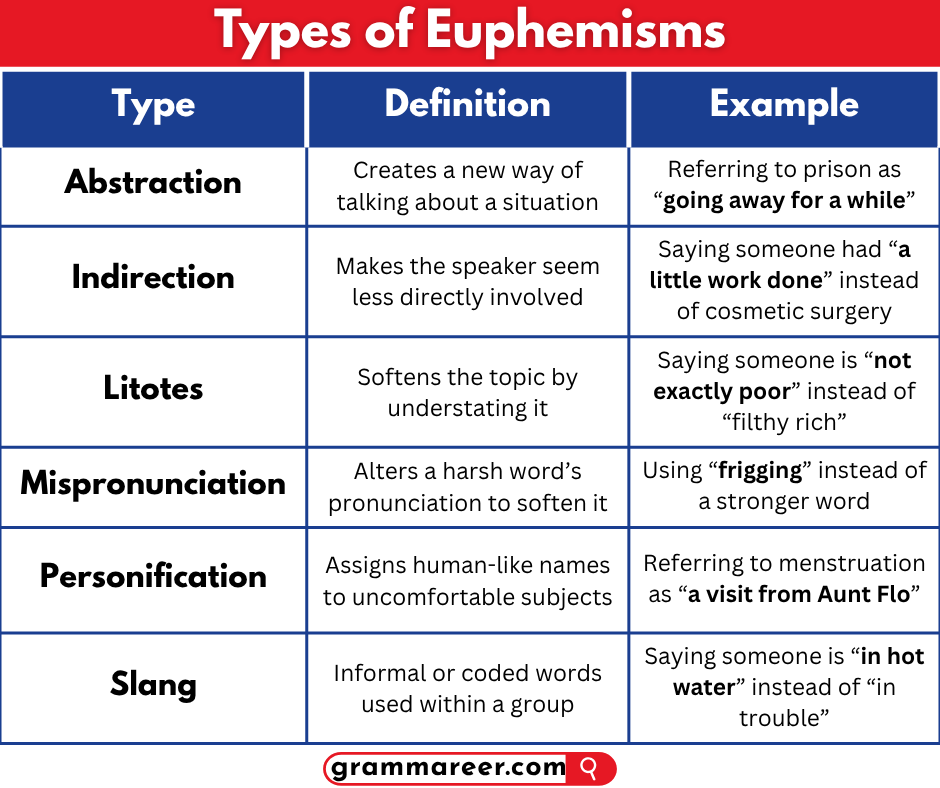
Common Euphemism Examples
We use euphemisms all the time — often without even realizing it. They help us talk about sensitive or serious topics in a gentler way. Whether it’s about someone’s job, health, or money, these polite expressions make conversations smoother and more comfortable.
Below, you’ll find some common euphemisms that people use in everyday life to sound more thoughtful and respectful.
Euphemisms in Politics
Politics is one area where euphemisms are used all the time. Politicians and government officials often choose softer words to make tough or negative actions sound less alarming. These phrases make communication sound formal and help control public reactions.
Examples:
| Euphemism | What It Means |
| Taking military action | Attacking another group or country |
| Collateral damage | Civilian casualties |
| Restructuring the system | Cutting jobs or departments |
| Enhanced interrogation | Torture |
| Regime change | Overthrowing a government |
Euphemisms in Business
In the business world, euphemisms are used to deliver bad news more politely. Instead of sounding negative or discouraging, they make messages feel more positive and professional.
Examples:
| Euphemism | What It Means |
| Exploring new opportunities | Fired or laid off |
| Downsizing | Reducing staff |
| Rightsizing | Firing some employees |
| Challenging task | Difficult work |
| Revenue adjustment | Loss or low income |
Euphemisms for Death
Death is a sensitive topic, and euphemisms help people talk about it gently. They show empathy and compassion, especially when someone is grieving. Instead of using direct or harsh words, euphemisms make the message sound kind and respectful.
Examples:
| Euphemism | What It Means |
| Passed away | Died |
| No longer with us | Dead |
| In a better place | At peace after death |
| Lost their life | Died, usually in an accident or tragedy |
| Gone to heaven | Religious way of saying someone died |
Euphemisms for Money and Career
Money and career topics can be personal, so people often use euphemisms to sound polite and respectful. They make sensitive financial or job-related discussions more comfortable.
Examples:
| Euphemism | What It Means |
| Between jobs | Unemployed |
| Let go | Fired from a job |
| Bringing home the bacon | Earning money |
| Breadwinner | Main earner in the family |
| Living comfortably | Financially stable |
Using euphemisms in such types of situations helps maintain a positive tone and shows consideration for others’ feelings.
Euphemism Examples in Literature
Writers often use euphemisms to make their language sound smoother or to express serious ideas in a subtle way. They help add emotion, hide harsh truths, or reflect the social attitudes of their time. Let’s look at a few interesting examples from famous works.
1. George Orwell’s 1984
In 1984, Orwell uses euphemisms to show how language can be used to control people. The government changes the meaning of words to hide the truth. For example:
- Ministry of Truth – actually spreads lies and rewrites history.
- Ministry of Peace – is responsible for war.
By using these ironic names, Orwell shows how powerful and dangerous words can be when used to manipulate thought.
| Euphemism | What It Really Means |
|---|---|
| Ministry of Truth | Department of lies and propaganda |
| Ministry of Peace | Department of war |
2. William Shakespeare’s Hamlet
Shakespeare used euphemisms to speak about sensitive topics like death in a poetic and emotional way. In Hamlet, instead of saying “die,” he used softer expressions such as:
- Sleep
- Rest
- The undiscovered country
These phrases give the idea of peace and mystery rather than fear or finality, showing how Shakespeare made dark subjects sound beautiful and thoughtful.
| Euphemism | What It Really Means |
|---|---|
| Sleep / Rest | Death |
| The undiscovered country | The afterlife or death |
3. Jane Austen’s Pride and Prejudice
Jane Austen uses gentle language to reflect the manners and values of her time. Instead of speaking directly about money or social class, she uses polite phrases:
- Saying someone was “in trade” hinted that they belonged to a lower social class.
- Talking about a woman’s “fortune” was a soft way of discussing her wealth.
These euphemisms reveal how much society cared about class, respectability, and appearances.
| Euphemism | What It Really Means |
|---|---|
| In trade | Belongs to a lower social class |
| Fortune or expectations | Wealth or money |
Why Euphemisms Matter?
Euphemisms play an important role in how we communicate. They help us express difficult or sensitive ideas without sounding rude or harsh. Using softer words shows empathy and makes conversations feel more thoughtful and respectful.
If what you’re saying might sound too direct or hurtful, take a moment to find a kinder way to express it. Sometimes, the right euphemism can make a big difference in how your message is received.
Summary
As we learned, euphemisms are polite ways to express uncomfortable or serious ideas without sounding harsh. They help us communicate sensitive topics with care and respect, making our words sound softer and more thoughtful. Whether used in daily life, business, politics, or writing, euphemisms keep conversations gentle and considerate. In short, they let us tell the truth kindly while maintaining empathy and respect in communication.
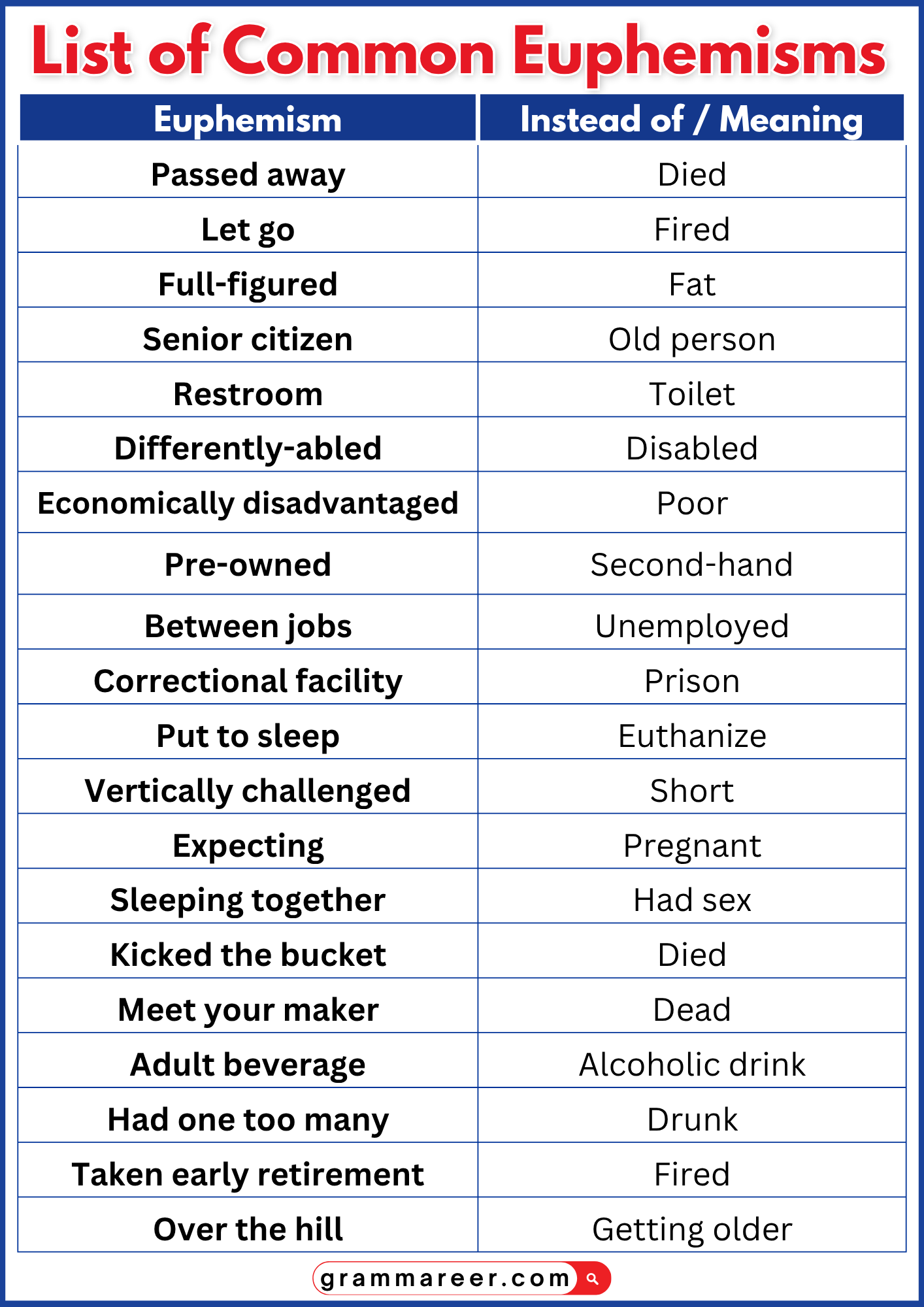
FAQs about Euphemism
A euphemism is just a polite way of saying something that might sound harsh or uncomfortable. Instead of saying something directly, we use softer words to make it sound kinder. It’s like wrapping a tough message in gentle language so it’s easier to hear.
We use euphemisms to be thoughtful and respectful, especially when talking about sensitive topics like death, money, or job loss. They help us express things without sounding rude or upsetting anyone. Using euphemisms can also make conversations feel more professional or friendly.
Sure! Here are a few examples of how you can use them naturally in everyday life:
• He was let go from his company last month.
• Her grandfather passed away peacefully in his sleep.
• Sarah is a senior citizen who still enjoys gardening every morning.
• The company is going through downsizing to manage costs.
• They’re living comfortably after years of hard work.
You May Also Like

